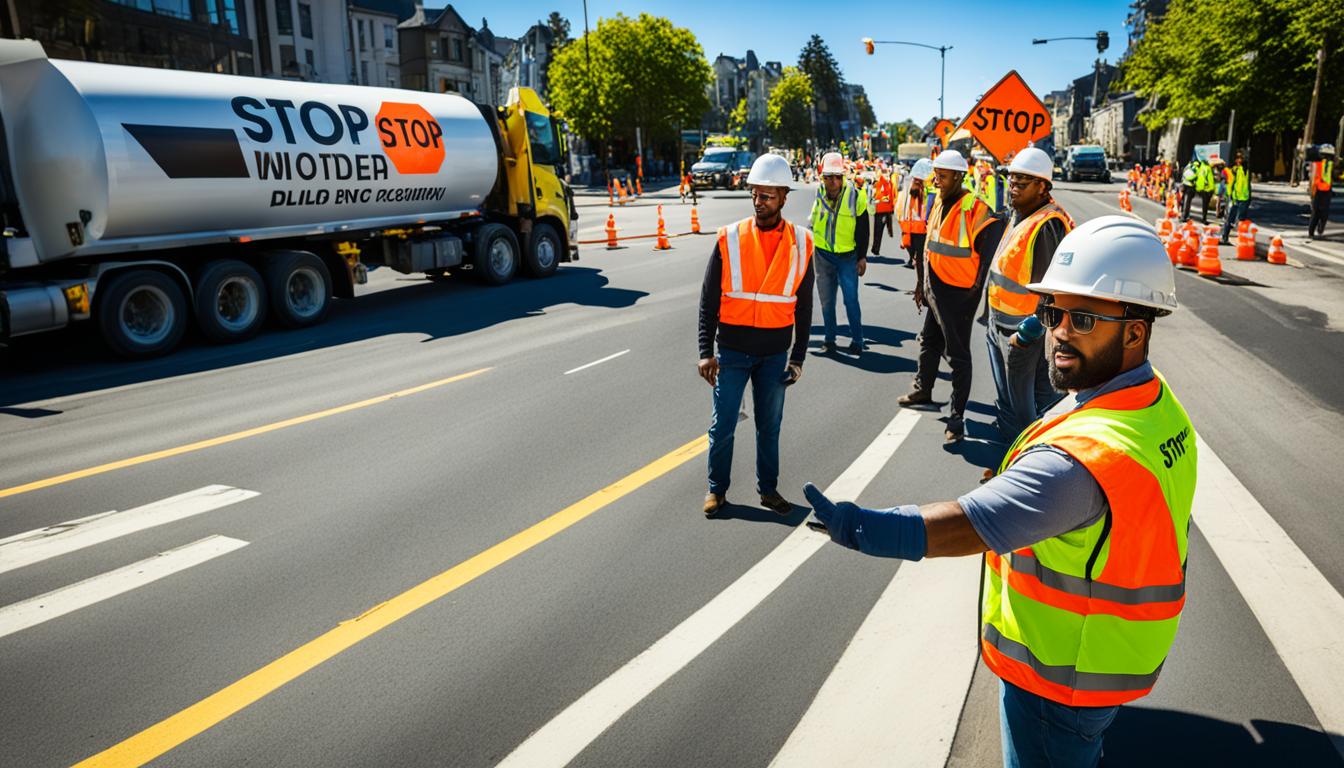Starting a traffic control business can be a lucrative venture with the growing demand for traffic control services. Whether it’s directing traffic at construction sites, managing traffic flow at events, or assisting public works departments, there is a need for professional traffic control and management. In this article, we will guide you through the steps to start your own traffic control company, from obtaining the necessary certifications and equipment to marketing your services and managing your business effectively.
Key Takeaways:
- Starting a traffic control business can be a profitable opportunity in the thriving traffic control industry.
- Obtaining the necessary certifications, such as traffic control specialist training, is essential for delivering professional services.
- Investing in high-visibility clothing, signage, and equipment will ensure the safety of your team and those around the work area.
- Understanding your target audience, which includes construction companies, event planners, and public works departments, is crucial for successful marketing and sales strategies.
- Implementing technology, such as intelligent traffic control systems, can enhance the efficiency and effectiveness of your traffic control operations.
The Traffic Control Business Market
The traffic control industry serves a wide range of clients, including construction companies, event planners, public works departments, and emergency responders. Your target audience will include both public and private sector clients on a local level who require assistance in directing vehicular and pedestrian traffic. Understanding your target market and their specific needs will be crucial for the success of your traffic control business.
Your Target Audience
- Construction companies: These companies often require traffic control services to manage traffic flow around their project sites and ensure the safety of workers and pedestrians.
- Event planners: Event organizers depend on traffic control specialists to coordinate the smooth flow of vehicles and pedestrians during large gatherings such as concerts, festivals, and sporting events.
- Public works departments: Municipalities and government agencies rely on traffic control services for road construction projects, maintenance activities, and traffic management during emergencies.
- Emergency responders: Ambulance services, fire departments, and law enforcement agencies may require traffic control assistance when responding to emergencies, accidents, or natural disasters.
- Local clients: Your traffic control business may also provide services to local businesses, schools, hospitals, and other establishments that require traffic management solutions.
By targeting these key audiences, you can position your traffic control business as a reliable and trusted partner in their efforts to maintain safety and efficiency in traffic control.
Understanding the unique needs and regulations of each target audience will help you tailor your services and marketing strategies to effectively reach and serve them. By providing exceptional customer service, maintaining safety standards, and delivering reliable traffic control solutions, you can build a strong reputation and attract repeat business and referrals.
Your Service: Professional Traffic Control and Management
As a traffic control business, your core service is to provide professional traffic direction and management. Your goal is to ensure the safe and efficient flow of traffic in various settings, including construction sites, events, and roadwork zones.
To deliver professional traffic control services, you dispatch trained and certified traffic control specialists to job sites. These specialists are equipped with high-visibility clothing, signage, cones, and other necessary equipment to effectively direct traffic and ensure the safety of workers and the public.
By prioritizing professionalism, safety, and customer service, you establish a reputation as a trusted traffic control service provider. This means enforcing standards and procedures that meet industry certifications and training requirements.
Training and certifications not only validate your team’s expertise but also enable them to handle various traffic control scenarios effectively. It ensures that your specialists are equipped with the knowledge and skills to navigate traffic flow, handle emergencies, and mitigate potential risks.
The role of professionalism in traffic control
Professionalism is at the core of your service. It dictates how your team interacts with clients, stakeholders, and the public. By maintaining a professional demeanor, your traffic control specialists instill confidence in those they serve, fostering trust and positive relationships.
Moreover, professionalism extends to your team’s appearance. The utilization of high-visibility clothing not only complies with safety regulations but also increases your visibility and credibility to motorists and pedestrians.
Standards and procedures for consistent service delivery
Establishing standards and procedures is crucial for delivering consistent and high-quality traffic control services. These guidelines ensure that all members of your team adhere to the same protocols, allowing for seamless coordination and effective traffic management.
Standardization encompasses everything from traffic control plans and equipment use to communication protocols and emergency response procedures. By following consistent practices, your team can efficiently adapt to different job sites and situations, ensuring smooth traffic flow.
Implementing industry-standard procedures also enhances your credibility as a professional traffic control service provider. Clients can trust that you follow best practices and prioritize safety and compliance in all aspects of your service.

Delivering exceptional customer service
Customer service plays a vital role in your traffic control business. As you engage with clients and the public, providing excellent service creates a positive experience that encourages repeat business and word-of-mouth referrals.
Effective communication, prompt response times, and a customer-focused approach are essential components of exceptional customer service. By valuing your clients’ needs and addressing their concerns, you build strong relationships built on trust and satisfaction.
Overall, your service as a traffic control business centers around professionalism, safety, and customer service. By ensuring your team is well-trained, equipped with the necessary certifications and high-visibility clothing, and adheres to established standards and procedures, you position yourself as a reliable and trusted partner in traffic control and management.
The Economics of a Traffic Control Business
Starting a traffic control business involves various costs and considerations that are essential for maintaining a profitable venture. Here, we will explore the key economic aspects related to equipment, certifications, marketing, labor, pricing, and cost management.
1. Costs
When starting a traffic control business, you should be prepared to make significant investments. The costs primarily include obtaining the necessary equipment and certifications. On average, you can expect to spend between $5,000 and $10,000 on equipment and certifications.
2. Labor
Labor is a significant ongoing cost for a traffic control business. As you provide your services, you will need to hire crew members who will be responsible for traffic control and management. The hourly rates for traffic control services typically range from $35 to $75 per hour per crew member. Efficiently managing labor costs is crucial for maintaining a healthy gross profit margin.
3. Pricing
Determining the right pricing strategy is essential for running a profitable traffic control business. Factors to consider include the prevailing market rates, the complexity of the project, and the specific requirements of clients. Conduct thorough market research to ensure your pricing aligns with industry standards while remaining competitive.
4. Marketing and Repeat Clients
Investing in marketing is vital for attracting new clients to your traffic control business. Implementing strategies such as search engine optimization (SEO), social media marketing, direct outreach, advertising, networking, and referral programs can help you reach a broader audience and generate leads. Additionally, building strong relationships with clients and delivering exceptional service can result in repeat business and word-of-mouth referrals, reducing marketing costs in the long run.
5. Cost Management
To maintain a healthy profit margin, effective cost management is crucial. Regularly review and optimize your expenses, including equipment maintenance, certifications renewal, and marketing efforts. Implementing cost-saving measures and negotiating favorable deals with suppliers can help you maximize your gross profit margin and improve overall financial stability.
By carefully considering the costs and implementing effective strategies for equipment, certifications, marketing, labor, pricing, and cost management, you can establish and grow a successful traffic control business.
Marketing Strategies for Your Traffic Control Business
To attract new clients and grow your traffic control business, it’s crucial to implement effective marketing strategies. By optimizing your website for search engines, building a strong social media presence, reaching out directly to potential clients, utilizing various advertising channels, networking with local businesses, and implementing a referral program, you can increase your visibility and attract more customers.
1. Search Engine Optimization (SEO)
Optimizing your website for search engines is essential in ensuring that your traffic control business appears prominently in search results. Focus on using relevant keywords, creating high-quality and informative content, and improving your website’s loading speed and mobile responsiveness.
2. Website and Social Media Marketing
The website is the face of your traffic control business and serves as an essential tool for showcasing your services. Make sure your website is user-friendly, visually appealing, and provides clear information about your offerings. Pairing your website with a strong social media presence can help you engage with potential clients and promote your services effectively.
3. Direct Outreach and Advertising
- Reach out directly to potential clients such as construction companies, event planners, and public works departments. Introduce your services, highlight your expertise, and explain how your traffic control solutions can benefit their projects.
- Utilize various advertising channels, such as online platforms, local newspapers, trade magazines, and outdoor signage, to create awareness and attract new customers. Tailor your advertising efforts to target your specific market.
4. Networking with Local Businesses
Building relationships with local businesses can lead to valuable partnerships and referrals. Attend industry events, join local business associations, and actively participate in networking opportunities. Collaborating with complementary businesses can open doors to new clientele and mutually beneficial projects.
5. Referral Program
Implementing a referral program can encourage satisfied clients and partners to spread the word about your traffic control business. Offer incentives or discounts to individuals or businesses that refer new clients to you. This word-of-mouth marketing can be a powerful tool in growing your customer base.
By combining these marketing strategies, you can effectively promote your traffic control business, increase brand awareness, and attract a steady stream of clients. Remember to monitor the results of your efforts, refine your strategies, and adapt to changes in the market to stay ahead of the competition.

Sales Strategies for Your Traffic Control Business
To secure new clients and contracts for your traffic control business, it is essential to implement proven sales strategies. These strategies will help you effectively reach out to potential clients and build strong relationships within the industry. By employing the right techniques, you can boost your chances of success in winning bids and proposals.
Cold Calling
One effective sales strategy is cold calling. This involves contacting potential clients directly to introduce your services and discuss how you can meet their traffic control needs. Prepare a script with key selling points and benefits, and be prepared to engage in meaningful conversations to showcase your expertise and professionalism.
Responding to Proposals and Bids
Another opportunity to secure new clients is by responding to proposals and bids. When a project requires traffic control services, companies often release requests for proposals or bids. Take the time to thoroughly review the requirements and tailor your proposal to demonstrate your understanding of the project’s needs. Highlight your experience, qualifications, and competitive pricing to differentiate your business.
Consultative Sales Approach
A consultative sales approach can be highly effective in the traffic control industry. Instead of simply selling your services, focus on understanding the client’s specific challenges and needs. Offer personalized solutions and recommendations that align with their goals. By demonstrating your expertise and providing valuable insights, you can build trust and establish yourself as a trusted advisor.
Building Strong Relationships with Clients
Building strong relationships with your clients is crucial for long-term success in the traffic control industry. Foster open lines of communication, deliver exceptional customer service, and consistently exceed client expectations. Demonstrating reliability, professionalism, and a genuine interest in their success will help you build trust and secure repeat business.
Exploring Cross-Selling Opportunities
Once you have established a relationship with a client, explore cross-selling opportunities. Determine if there are additional traffic control services or related offerings you can provide. By demonstrating your ability to meet multiple needs, you can deepen your client relationships and increase your revenue streams.
Forming Strategic Partnerships
Consider forming strategic partnerships with complementary businesses in the construction industry. Collaborating with companies that offer related services, such as road construction or event management, can create opportunities for mutual referrals and joint ventures. These partnerships can enhance your credibility and expand your network of potential clients.
By implementing these sales strategies, you can effectively promote your traffic control business, secure new clients, and ultimately grow your business in the competitive industry.
Operations and Execution
Establishing efficient processes and procedures is crucial for the successful operation of your traffic control business. By focusing on key areas such as staffing, scheduling, safety, equipment, and customer service, you can ensure that your operations run smoothly and effectively.
Staffing
One of the first steps in building a successful traffic control team is hiring qualified staff. Look for individuals who have the necessary certifications and training to perform their roles effectively. Consider conducting thorough background checks and interviews to ensure you hire reliable and trustworthy employees. By assembling a skilled and dedicated team, you can provide top-notch traffic control services to your clients.
Scheduling
Developing efficient schedules is essential for maximizing productivity and meeting client demands. Consider the traffic control requirements of each project and allocate resources accordingly. Evaluate factors such as traffic volume, project duration, and other logistical considerations to create realistic and effective schedules. By prioritizing effective scheduling practices, you can optimize efficiency and ensure that your team is deployed in the most efficient manner.
Safety
Prioritizing safety in all aspects of your operations is paramount in the traffic control business. Emphasize the importance of adhering to safety protocols and provide ongoing training to your staff. Equip them with high-visibility clothing, proper signage, and reliable traffic control equipment to ensure their safety on the job. By maintaining a strong safety culture, you can minimize accidents and create a positive reputation for your business.
Equipment
Having well-maintained equipment is crucial for delivering high-quality traffic control services. Regularly inspect, maintain, and repair your equipment to ensure it is in optimal condition. This includes traffic cones, barricades, and other necessary tools. By investing in quality equipment and keeping it up to date, you can enhance the efficiency and effectiveness of your operations.

Customer Service
Delivering exceptional customer service is essential for building strong relationships with clients and securing repeat business. Train your staff to prioritize professionalism, communication, and responsiveness when interacting with clients. Promptly address any concerns or issues that arise and strive to exceed client expectations. By consistently providing outstanding customer service, you can establish a reputation for reliability and earn the trust of your clients.
Technology in Traffic Control
Technology plays a crucial role in modern traffic control. By researching and implementing the right technological solutions for your traffic control business, such as intelligent traffic control systems and software, you can significantly improve the efficiency and effectiveness of managing traffic flow.
Intelligent traffic control systems use advanced algorithms and real-time data to optimize traffic flow at intersections. These systems intelligently adjust signal timings based on current traffic conditions, helping to reduce congestion and improve overall traffic efficiency. By partnering with reputable technology companies that specialize in intelligent traffic control, you can benefit from their expertise and access cutting-edge hardware and software solutions.
The hardware components of intelligent traffic control systems include traffic detectors, cameras, and signal controllers. These devices work together to gather data and facilitate the smooth flow of traffic. Traffic detectors, such as loop detectors or radar sensors, capture real-time information about vehicle presence and traffic volume. Cameras provide visual surveillance to monitor traffic conditions, while signal controllers regulate the timing of traffic lights based on the data collected from these sensors.
Software plays a crucial role in processing and analyzing the data collected by the hardware components. Advanced algorithms and machine learning techniques contribute to real-time traffic analysis, predicting traffic patterns, and optimizing signal timings. This helps ensure efficient traffic management and minimizes delays for commuters and pedestrians.
Implementing intelligent traffic control technology can have numerous benefits for your traffic control business. It can help reduce traffic congestion, increase road safety, and improve travel times. Additionally, these systems provide valuable data and insights that can be used to make informed decisions and optimize future traffic management strategies.
In conclusion, by embracing the power of technology and partnering with reliable technology companies, you can enhance your traffic control operations and provide efficient and effective services to your clients.
Conclusion
Starting a traffic control business can be a challenging yet rewarding endeavor. By carefully planning your steps and taking the necessary actions, you can position yourself for success in the growing traffic control industry. Firstly, ensure you obtain the relevant certifications and equip your team with high-visibility clothing, signage, and cones to ensure safety while directing traffic.
Implementing effective marketing strategies such as search engine optimization, social media marketing, and direct outreach can help you attract new clients and establish a strong presence in the market. Additionally, developing solid sales strategies, including cold calling, consultative sales, and building relationships with clients, will assist you in securing contracts and generating revenue.
Smooth operations and execution are vital for the seamless functioning of your traffic control business. Focus on staffing, scheduling, safety measures, and exceptional customer service to ensure client satisfaction and repeat business. Finally, embrace the technological advancements in traffic control and consider partnering with technology experts to enhance your efficiency and effectiveness in managing traffic flow.
Overall, with careful planning, dedication, and a customer-centric approach, your traffic control business can thrive in the ever-evolving traffic control industry, providing valuable services and generating profitable returns.
FAQ
How much does it cost to start a traffic control business?
Starting a traffic control business can require investments in equipment and certifications, which can range between ,000 to ,000. Additionally, ongoing labor costs should be considered, with hourly rates for traffic control services typically ranging from to per hour per crew member.
What marketing strategies can I use to attract clients to my traffic control business?
Implementing effective marketing strategies for your traffic control business can include optimizing your website for search engines, building a presence on social media, reaching out directly to potential clients, advertising through various channels, networking with local businesses, and implementing a referral program to encourage word-of-mouth marketing.
How can I secure new clients and contracts for my traffic control business?
To secure new clients and contracts, you can implement proven sales strategies for your traffic control business. This can include cold calling, responding to proposals and bids, taking a consultative sales approach, building strong relationships with clients, exploring cross-selling opportunities, and forming strategic partnerships with complementary businesses in the construction industry.
What are the necessary certifications and training required for a traffic control business?
To operate a traffic control business, you will need to obtain the necessary certifications and training. This can include certifications in traffic control and flagging, as well as training in proper safety procedures and equipment usage.
What kind of equipment do I need for a traffic control business?
As a traffic control business, you will need to have the proper equipment to direct and manage traffic safely. This can include high-visibility clothing, signage, cones, and other equipment necessary for traffic control operations. Additionally, you may need vehicles to transport your team and equipment to job sites.
How can technology help in managing traffic control?
Technology plays a crucial role in modern traffic control. Researching and implementing the right technological solutions for your business, such as intelligent traffic control systems and software, can improve efficiency and effectiveness in managing traffic flow.




